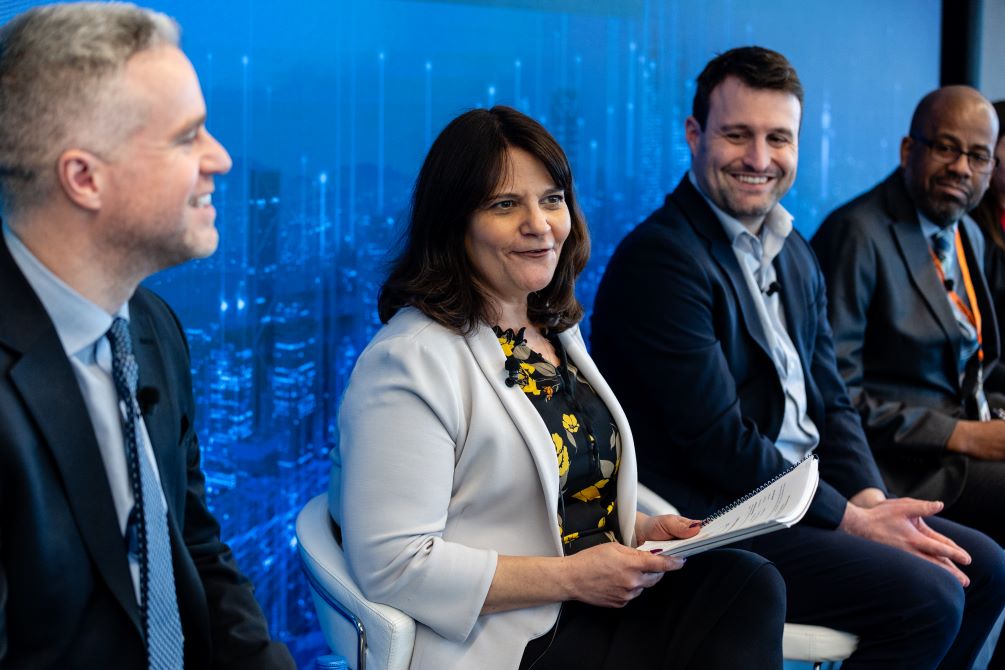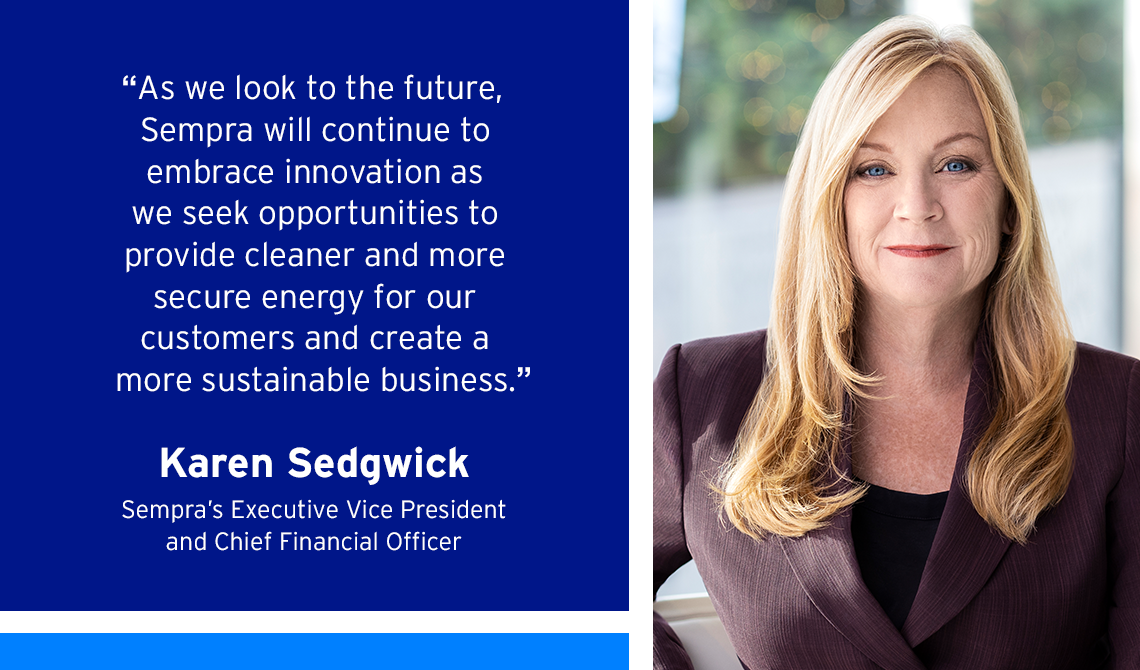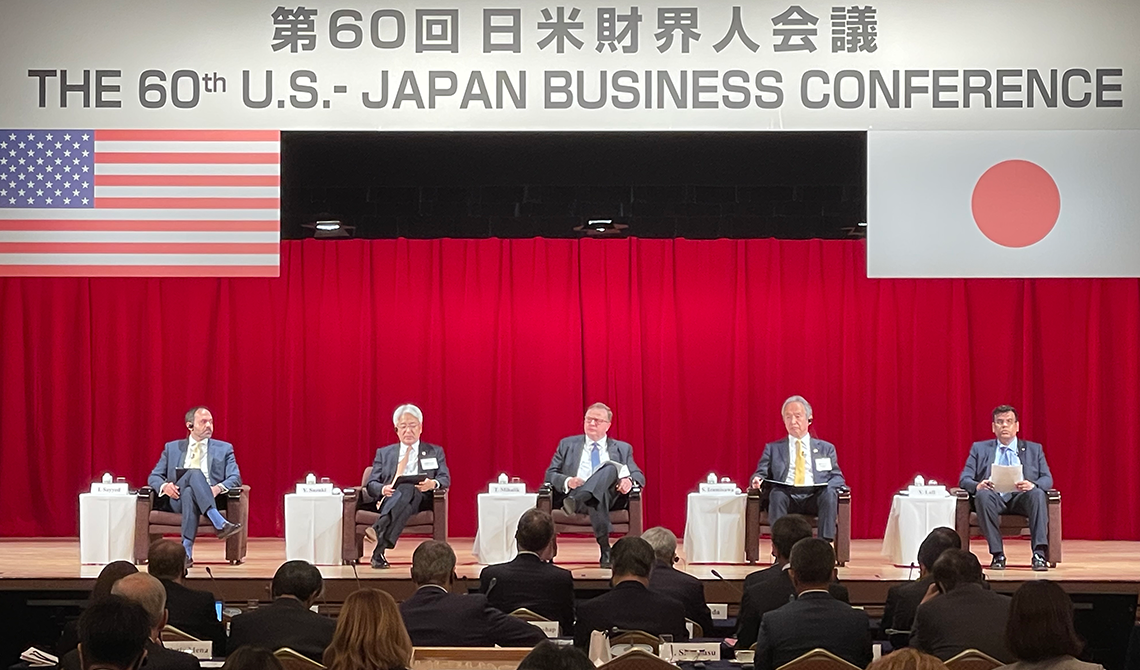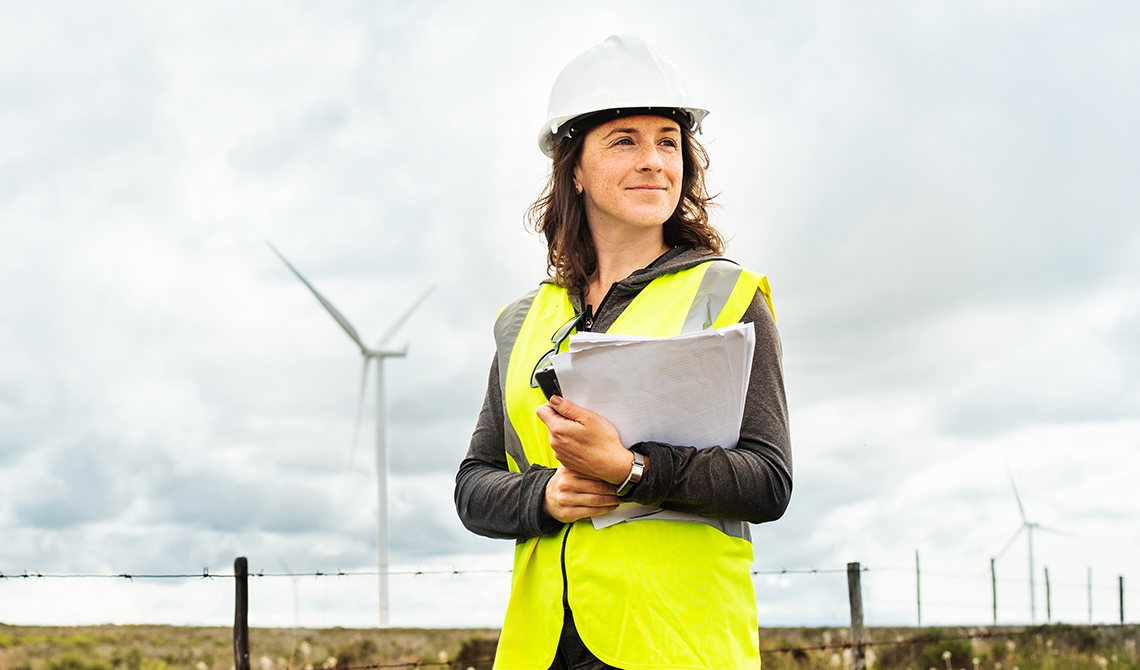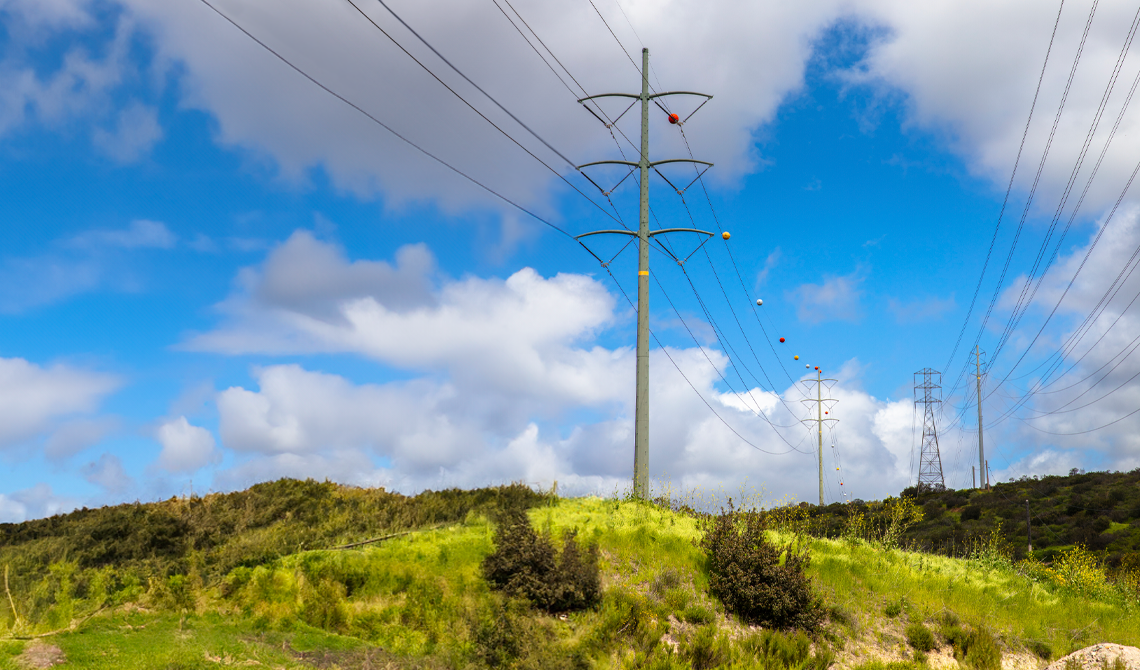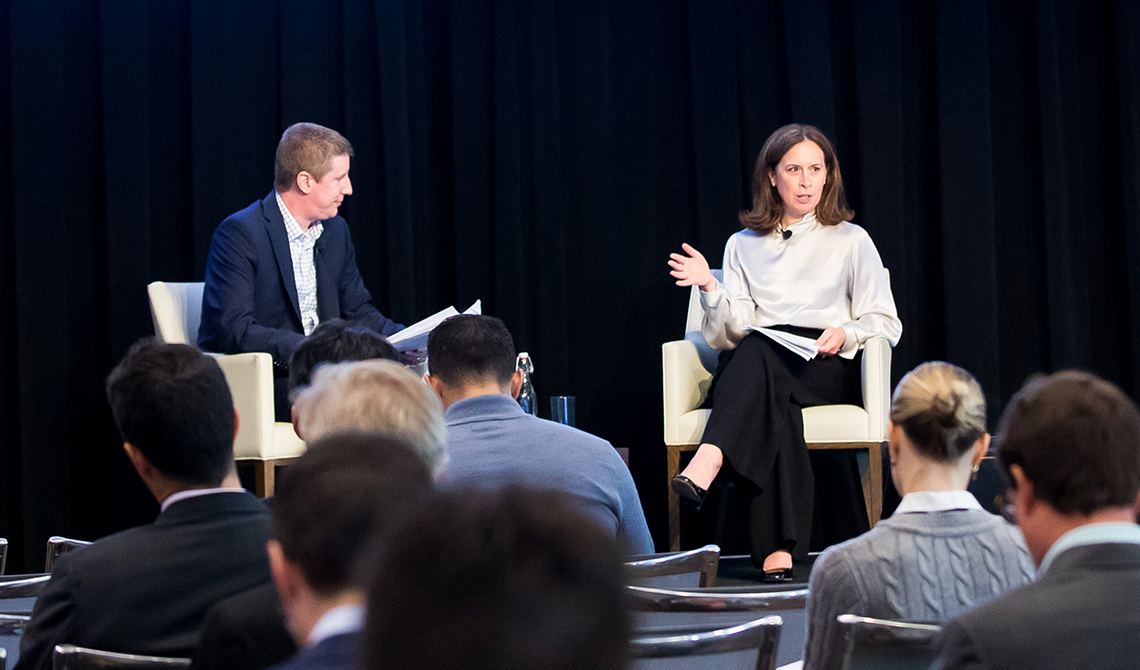Since debuting on the New York Stock Exchange nearly 25 years ago, Sempra has demonstrated the ability to deliver long-term sustainable value to shareholders through strategic energy infrastructure investments. On July 20, Jeffrey W. Martin, Sempra’s chairman and chief executive officer, visited the floor of the stock exchange as a special guest on CNBC to celebrate the debut of Mad Money’s new studio and to discuss an evolving set of investment opportunities in the energy space.
Jim Cramer, host of Mad Money, and Martin discussed the important role of U.S. energy companies in supporting future economic growth, among other topics. They also talked about the expected need to more than double domestic exports of liquefied natural gas (LNG) by the end of the decade. The build-out of new LNG facilities is critical to assisting America’s trading partners in Europe and Asia as they look to improve their energy security and transition to lower carbon energy sources.
“Over time, we think the energy grid will expand and benefit from innovation and new technologies,” said Martin. “At the end of the day, it is all about competition and that is one of the reasons we are so bullish on the U.S. We have the most skilled workforce in the world and combined with the depth of our capital markets and commitment to innovation, we envision America continuing to extend its leadership position in the world.”
In part, future economic growth is expected to come from the continued integration of the U.S. market with the economies of Canada and Mexico.
“There is an intersection of opportunity right now where there will be a reshoring of industries from Asia back to North America,” said Martin. This translates into significant economic opportunity for the U.S., Canada and Mexico.
Martin further discussed the strong growth potential in the company’s core utility platforms.
“California is the fifth largest economy in the world, Texas is the ninth,” said Martin. “These states are also the biggest energy markets in the U.S. and Sempra has been fortunate to build leading utility franchises in both markets with the goal of ensuring energy is more abundant, increasingly clean and — just as importantly — affordable.”
This article contains statements that constitute forward-looking statements within the meaning of the Private Securities Litigation Reform Act of 1995. Forward-looking statements are based on assumptions with respect to the future, involve risks and uncertainties, and are not guarantees. Future results may differ materially from those expressed in any forward-looking statements. These forward-looking statements represent our estimates and assumptions only as of the date of this article. We assume no obligation to update or revise any forward-looking statement as a result of new information, future events or other factors.
In this article, forward-looking statements can be identified by words such as "believes," "expects," "intends," "anticipates," "plans," "estimates," "projects," "forecasts," "should," "could," "would," "will," "confident," "may," "can," "potential," "possible," "proposed," "in process," "under construction," "in development," "opportunity," "target," "outlook," "maintain," "continue," "goal," "aim," "commit," or similar expressions, or when we discuss our guidance, priorities, strategy, goals, vision, mission, opportunities, projections, intentions or expectations.
Factors, among others, that could cause actual results and events to differ materially from those described in any forward-looking statements include risks and uncertainties relating to: California wildfires, including the risks that we may be found liable for damages regardless of fault and that we may not be able to recover all or a substantial portion of costs from insurance, the wildfire fund established by California Assembly Bill 1054, in rates from customers or a combination thereof; decisions, investigations, regulations, issuances or revocations of permits and other authorizations, renewals of franchises, and other actions by (i) the California Public Utilities Commission (CPUC), Comisión Reguladora de Energía, U.S. Department of Energy, U.S. Federal Energy Regulatory Commission, Public Utility Commission of Texas, and other regulatory and governmental bodies and (ii) states, counties, cities and other jurisdictions in the U.S., Mexico and other countries in which we do business; the success of business development efforts, construction projects and acquisitions and divestitures, including risks in (i) the ability to make a final investment decision, (ii) completing construction projects or other transactions on schedule and budget, (iii) the ability to realize anticipated benefits from any of these efforts if completed, and (iv) obtaining the consent or approval of partners or other third parties, including governmental entities and regulatory bodies; the resolution of civil and criminal litigation, regulatory inquiries, investigations and proceedings, arbitrations, and property disputes, including those related to the natural gas leak at Southern California Gas Company's (SoCalGas) Aliso Canyon natural gas storage facility; changes to laws, including changes to certain of Mexico's laws and rules that impact energy supplier permitting, energy contract rates, the electricity industry generally and the ability to import, export, transport and store hydrocarbons; cybersecurity threats, including by state and state-sponsored actors, to the energy grid, storage and pipeline infrastructure, information and systems used to operate our businesses, and confidentiality of our proprietary information and personal information of our customers and employees, including ransomware attacks on our systems and the systems of third-party vendors and other parties with which we conduct business, all of which have become more pronounced due to recent geopolitical events and other uncertainties, such as the war in Ukraine; failure of foreign governments and state-owned entities to honor their contracts and commitments; actions by credit rating agencies to downgrade our credit ratings or to place those ratings on negative outlook and our ability to borrow on favorable terms and meet our debt service obligations; the impact of energy and climate policies, legislation, rulemaking and disclosures, as well as related goals set and actions taken by companies in our industry, including actions to reduce or eliminate reliance on natural gas generally and any deterioration of or increased uncertainty in the political or regulatory environment for California natural gas distribution companies and the risk of nonrecovery for stranded assets; the pace of the development and adoption of new technologies in the energy sector, including those designed to support governmental and private party energy and climate goals, and our ability to timely and economically incorporate them into our business; weather, natural disasters, pandemics, accidents, equipment failures, explosions, acts of terrorism, information system outages or other events that disrupt our operations, damage our facilities and systems, cause the release of harmful materials, cause fires or subject us to liability for property damage or personal injuries, fines and penalties, some of which may not be covered by insurance, may be disputed by insurers or may otherwise not be recoverable through regulatory mechanisms or may impact our ability to obtain satisfactory levels of affordable insurance; the availability of electric power and natural gas and natural gas storage capacity, including disruptions caused by failures in the transmission grid or limitations on the withdrawal of natural gas from storage facilities; the impact of the COVID-19 pandemic, including potential vaccination mandates, on capital projects, regulatory approvals and the execution of our operations; the impact at San Diego Gas & Electric Company (SDG&E) on competitive customer rates and reliability due to the growth in distributed and local power generation, including from departing retail load resulting from customers transferring to Community Choice Aggregation and Direct Access, and the risk of nonrecovery for stranded assets and contractual obligations; Oncor Electric Delivery Company LLC's (Oncor) ability to eliminate or reduce its quarterly dividends due to regulatory and governance requirements and commitments, including by actions of Oncor's independent directors or a minority member director; volatility in foreign currency exchange, inflation and interest rates and commodity prices, including inflationary pressures in the U.S., and our ability to effectively hedge these risks and with respect to inflation and interest rates, the impact on SDG&E's and SoCalGas' cost of capital and the affordability of customer rates; changes in tax and trade policies, laws and regulations, including tariffs, revisions to international trade agreements and sanctions, such as those that have been imposed and that may be imposed in the future in connection with the war in Ukraine, which may increase our costs, reduce our competitiveness, impact our ability to do business with certain current or potential counterparties, or impair our ability to resolve trade disputes; and other uncertainties, some of which may be difficult to predict and are beyond our control.
These risks and uncertainties are further discussed in the reports that Sempra has filed with the U.S. Securities and Exchange Commission (SEC). These reports are available through the EDGAR system free-of-charge on the SEC's website, www.sec.gov, and on Sempra's website, www.sempra.com. Investors should not rely unduly on any forward-looking statements.
Sempra Infrastructure, Sempra Texas, Sempra Texas Utilities, Oncor and Infraestructura Energética Nova, S.A.P.I. de C.V. (IEnova) are not the same companies as the California utilities, SDG&E or SoCalGas, and Sempra Infrastructure, Sempra Texas, Sempra Texas Utilities, Oncor and IEnova are not regulated by the CPUC.
